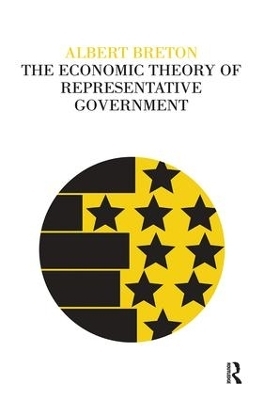
The Economic Theory of Representative Government
Seiten
2017
Routledge (Verlag)
978-1-138-53535-0 (ISBN)
Routledge (Verlag)
978-1-138-53535-0 (ISBN)
This book provides a theory capable of explaining the patterns of public expenditures and taxation that occur under representative government. Economists and political scientists have come to realize that issues of public policy and public finance cannot be solved on the naive assumption that these are problems tackled by a government that exists only to serve the public good. Instead, government must be understood as one of the major economic institutions of society, one that behaves like more familiar economic institutions--the household and the firm--though the market it confronts is a market for policies rather than for goods and services. Albert Breton's pathbreaking work remains important in taking us toward a theory of representative government that enables an understanding of the observed behavior of political institutions.
The author's analysis is cast in a relatively simple demand, supply and demand-supply-equilibrium framework, using the tools of marginal and stability analysis to explain the forces that influence and determine the flow of resources as they are allocated between competing ends in the public sector. The book presents a model of demand by citizens, who are assumed to be maximizing their desires for specific public policies and private goods, and a model of the supply of public policies by politicians and bureaucrats, who are assumed to be maximizing the probability of their re-election and the size of their budgets. Breton defines government policies and the institutional framework for collective choices in terms that render them amenable to further analysis.
The main accomplishment of Breton's theory is that it provides the ability to analyze the interaction of individuals and generates testable propositions about the behavior of these individuals as well as about the behavior of public expenditures and taxation in more aggregative terms. In this way the book will be useful to students of economics, economists, and those interested in economic theory.
The author's analysis is cast in a relatively simple demand, supply and demand-supply-equilibrium framework, using the tools of marginal and stability analysis to explain the forces that influence and determine the flow of resources as they are allocated between competing ends in the public sector. The book presents a model of demand by citizens, who are assumed to be maximizing their desires for specific public policies and private goods, and a model of the supply of public policies by politicians and bureaucrats, who are assumed to be maximizing the probability of their re-election and the size of their budgets. Breton defines government policies and the institutional framework for collective choices in terms that render them amenable to further analysis.
The main accomplishment of Breton's theory is that it provides the ability to analyze the interaction of individuals and generates testable propositions about the behavior of these individuals as well as about the behavior of public expenditures and taxation in more aggregative terms. In this way the book will be useful to students of economics, economists, and those interested in economic theory.
Orville Brim
I: Background and Definitions; 1: An Introduction; 2: The Output of Governments; 3: The Institutional Framework; II: The Structure of Demand; 4: The Origins of Political Action; 5: The Instruments of Political Participation; 6: The Demand for Government Policies; III: The Structure of Supply; 7: The Behavior of Political Parties; 8: Technical Constraints on the Behavior of the Governing Party; 9: The Behavior of Bureaus; IV: Resource Allocation in the Public Sector; 10: The Equilibrium Quantity of Government Policies; 11: Comparative Statical Displacements of Equilibrium; 12: Conclusion
| Erscheinungsdatum | 19.12.2017 |
|---|---|
| Verlagsort | London |
| Sprache | englisch |
| Maße | 152 x 229 mm |
| Gewicht | 453 g |
| Themenwelt | Wirtschaft ► Volkswirtschaftslehre |
| ISBN-10 | 1-138-53535-4 / 1138535354 |
| ISBN-13 | 978-1-138-53535-0 / 9781138535350 |
| Zustand | Neuware |
| Informationen gemäß Produktsicherheitsverordnung (GPSR) | |
| Haben Sie eine Frage zum Produkt? |
Mehr entdecken
aus dem Bereich
aus dem Bereich
Buch | Softcover (2024)
Kohlhammer (Verlag)
CHF 75,60
eine Einführung in die Theorie der Güter-, Arbeits- und Finanzmärkte
Buch | Softcover (2024)
Mohr Siebeck (Verlag)
CHF 54,60


